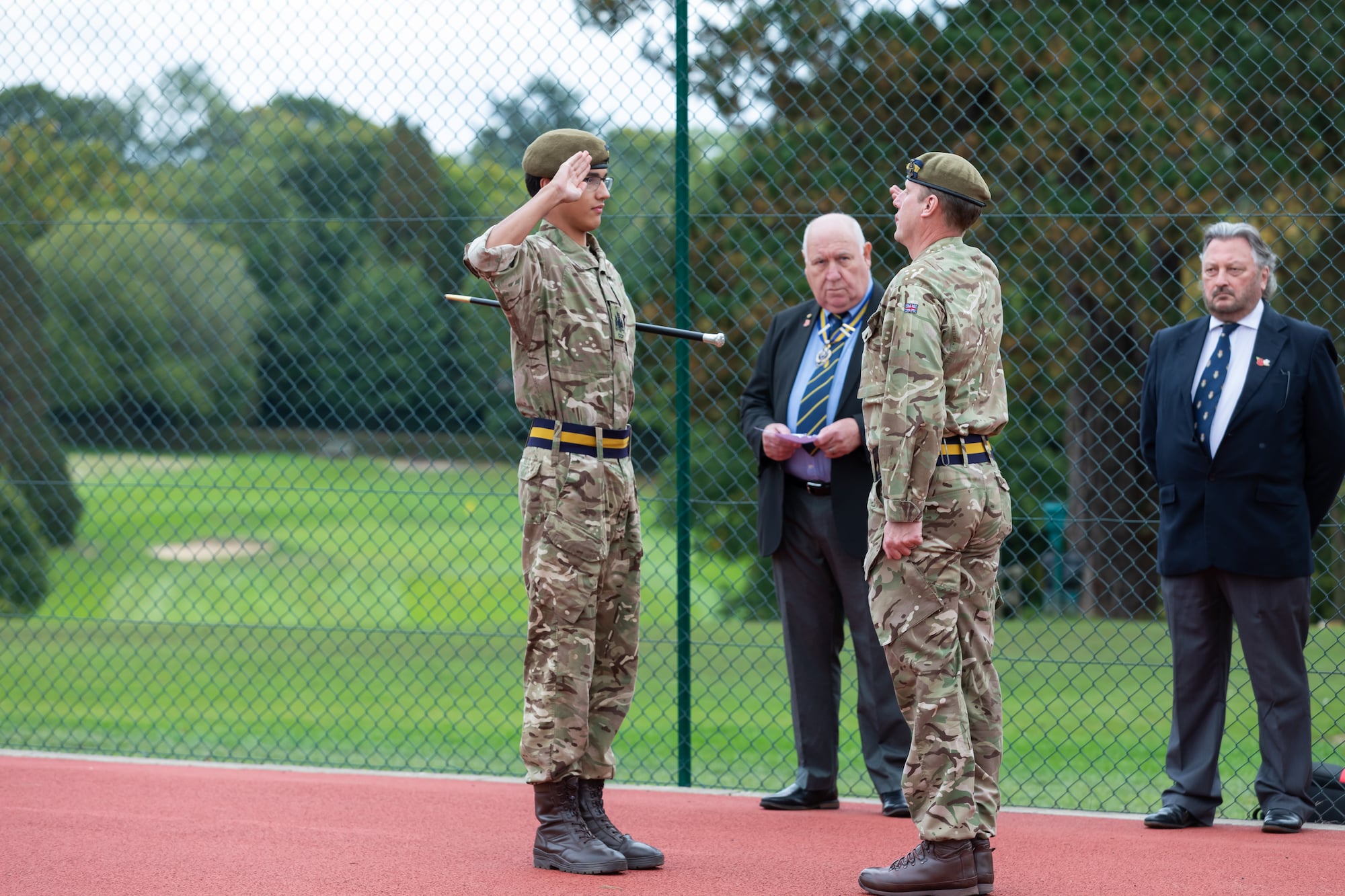The Sixth Form Purvis Society was delighted to welcome Mr Stephen Cooper to talk about his first book, “The Final Whistle – the Great War in Fifteen Players”: a book described by Ian Hislop as a “fresh and fascinating take on the impact of the Great War with a novel and moving focus” and which was named Rugby Book of the Year at the British Sports Book Awards of 2013.
Educated at Cambridge (where he read English) and following a long career in advertising and writing as a travel journalist, Stephen was inspired by his grandfather’s service on the Somme, an experience of which he never spoke. A rugby fanatic, his story begins with the fact that Rosslyn Park (where he coached) had a memorial to players lost in WW2 but not in WW1; perhaps it had been lost when the club moved in 1956. Believing that memorials are about people and not artefacts, Stephen set about tracing the 72 players who were associated with Rosslyn Park Rugby Club and who were believed to have died during the conflict, embarking on a two-year detective story, uncovering a wealth of detail regarding this depressing number of players and raising the figure to 109. Of the 350 (or more) who served, this represented an exceptionally high mortality rate, indicative, perhaps, of the team spirit, determination and courage of these fit young sportsmen.
writing as a travel journalist, Stephen was inspired by his grandfather’s service on the Somme, an experience of which he never spoke. A rugby fanatic, his story begins with the fact that Rosslyn Park (where he coached) had a memorial to players lost in WW2 but not in WW1; perhaps it had been lost when the club moved in 1956. Believing that memorials are about people and not artefacts, Stephen set about tracing the 72 players who were associated with Rosslyn Park Rugby Club and who were believed to have died during the conflict, embarking on a two-year detective story, uncovering a wealth of detail regarding this depressing number of players and raising the figure to 109. Of the 350 (or more) who served, this represented an exceptionally high mortality rate, indicative, perhaps, of the team spirit, determination and courage of these fit young sportsmen.
Believing that the war would “be over by Christmas”, members of the RFU joined up in droves, mostly as ordinary soldiers, in order to get out and fight as soon as possible; 90% of the players at Rosslyn Park volunteered in the first two months of the war. Conscription was introduced in January 1916 (as, incredibly, were the first steel helmets!). Mr Cooper commented that of the 30 players in the last international rugby game (rugby stopped for the duration of the war) played against France in April 1914, 11 were dead by 1918, three of whom were Rosslyn Park players. He introduced them to us, showing match and group photos.
mostly as ordinary soldiers, in order to get out and fight as soon as possible; 90% of the players at Rosslyn Park volunteered in the first two months of the war. Conscription was introduced in January 1916 (as, incredibly, were the first steel helmets!). Mr Cooper commented that of the 30 players in the last international rugby game (rugby stopped for the duration of the war) played against France in April 1914, 11 were dead by 1918, three of whom were Rosslyn Park players. He introduced them to us, showing match and group photos.
Moving away from generalities, we heard a series of personal stories, all illustrated with photographs, documents and details of the lives of the men. Charles George Gordon Bayly (great-nephew of Gordon of Khartoum) was one of the first pilots engaged in the war and was the first flying officer to be shot down and killed. Guy du Maurier (Daphne’s uncle) was a career soldier who rose to the rank of Lt Colonel and was killed in action aged 49; Alexander Findlater Todd (who was 6’ 2” tall) went to Cambridge (won three Blues), was a British Lion, served in the Boer War and died at Ypres, shot through the neck; Nowell Oxland, a vicar’s son from Cumbria, fought at Gallipoli and, believing he was unlikely to survive the war, wrote a poem entitled “Farewell”. It was published by The Times 13 days after his death at Suva on August 9th, but retitled “Outward Bound” as its publication coincided with the names of over 700 recent deaths and it was felt that “Farewell” was not a title conducive to a positive war effort!
photographs, documents and details of the lives of the men. Charles George Gordon Bayly (great-nephew of Gordon of Khartoum) was one of the first pilots engaged in the war and was the first flying officer to be shot down and killed. Guy du Maurier (Daphne’s uncle) was a career soldier who rose to the rank of Lt Colonel and was killed in action aged 49; Alexander Findlater Todd (who was 6’ 2” tall) went to Cambridge (won three Blues), was a British Lion, served in the Boer War and died at Ypres, shot through the neck; Nowell Oxland, a vicar’s son from Cumbria, fought at Gallipoli and, believing he was unlikely to survive the war, wrote a poem entitled “Farewell”. It was published by The Times 13 days after his death at Suva on August 9th, but retitled “Outward Bound” as its publication coincided with the names of over 700 recent deaths and it was felt that “Farewell” was not a title conducive to a positive war effort!
There were several others described in no less passionate and detailed terms and Mr Cooper was also quick to acknowledge the help he had received. Jack Bodenham (who did not want to to be an officer and whose body was never found) has living relatives and when Stephen visited one of them (a Director of ‘Floris’) he found piles of the soldier’s letters and original photographs awaiting him. Arthur Harrison was involved in the Zeebrugge Raid, was shot through the jaw and believed dead by his crew, but regained consciousness and, with jaw hanging off, continued to lead his men on an assault. He was awarded a posthumous VC.
Returning to rugby, Mr Cooper began to wind up his presentation by pointing out that the game was banned during the war (football was not), but it was kept alive by public school XVs and he listed several schools that, after the war, dropped football and took up rugby, recognising the power of the game especially in terms of discipline and fitness, citing one instance of a soldier with shell shock being virtually cured after becoming involved in sport once again. I could go on… but have to quote Mr Cooper’s opening words, themselves penned by Alberto Celotto: “Forget about battles, weapons and strategies. Focus on men, on their stories, and they will lead you to discover the undiscovered.” Mr Cooper believed this statement summarized far better than he had, what it was all about, and I know it is far more elegantly phrased than anything I have written!
banned during the war (football was not), but it was kept alive by public school XVs and he listed several schools that, after the war, dropped football and took up rugby, recognising the power of the game especially in terms of discipline and fitness, citing one instance of a soldier with shell shock being virtually cured after becoming involved in sport once again. I could go on… but have to quote Mr Cooper’s opening words, themselves penned by Alberto Celotto: “Forget about battles, weapons and strategies. Focus on men, on their stories, and they will lead you to discover the undiscovered.” Mr Cooper believed this statement summarized far better than he had, what it was all about, and I know it is far more elegantly phrased than anything I have written!
The audience was enthralled as these personal stories unfolded and the end, when it came, was unwelcome. Why “Final Whistle”? The whistle these men never heard… The book is available through the usual outlets (a sequel is on the way) and I must add that the royalties and half the production costs are being donated to charity.
Dr Christopher Mann
Back to all news











